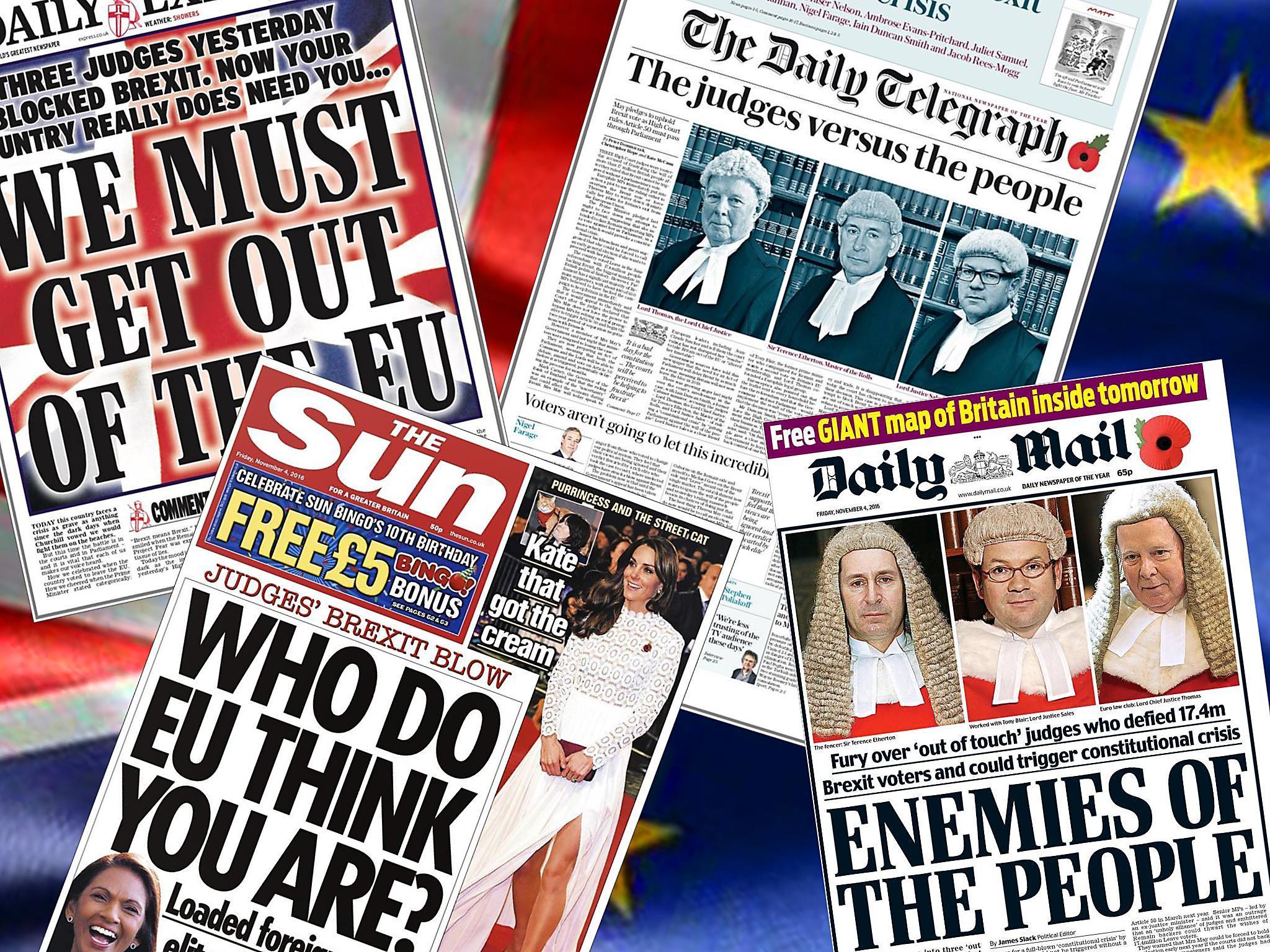Daily Mail accused of 'attack on the rule of law' amid criticism of tabloid Brexit legal challenge coverage
'These headlines are deliberately stirring anxieties and tension', says human rights lawyer

British newspapers have been widely condemned for coverage in the aftermath of a High Court ruling that is expected to see Brexit delayed.
Three senior judges ruled on Thursday that Theresa May cannot trigger Article 50, and the withdrawal from the European Union, without a vote in Parliament.
The trio said the government and Crown had “no power to alter the law of the land by use of its prerogative powers”.
But a selection of media accused the judges of interfering with democracy, prompting a furious response from lawyers, politicians and journalists.
The Daily Mail came in for particular criticism, with many claiming it was inciting hatred with its front page story, which carried the headline 'Enemies of the people', alongside images of the three judges.
Schona Jolly, a human rights and equalities barrister from Cloisters Chambers, said anyone questioning "our powerfully democratic traditions" should "read the judgement".
"This hostile and abusive attack on the judges is an attack on the rule of law," she told The Independent.

"In a time when the country is deeply divided, these headlines are deliberately stirring anxieties and tension.
"We should be proud to have an independent judiciary that is prepared to stand up for the rights of all citizens.
"Yesterday's decision was legally sound. The claimant’s arguments were far more powerful and persuasive than those made by the government. The court has upheld the centuries-old constitutional principle in this country that parliamentary sovereignty matters; That the Government of the day cannot remove people's rights without parliament authorising it to do so.
"The reaction of sections of the media is politically rather than democratically driven. If upholding the rule of law is 'elitist', those commentators need to question what sort of Brexit they are advocating."
Joshua Rozenberg QC, a British legal commentator and journalist, said: “It does these papers no credit that they are attacking the judges rather than their judgement.
“And it certainly does nothing for the government’s prospects of successful appeal.”
Fraud and regulatory lawyer Mukul Chawla QC said: “Don’t complain about ‘unelected judges’ before reading that the government expressly accepted this was a proper matter for the courts.”
Meanwhile, many suggested coverage of the ruling showed little had been learned following the murder of MP Jo Cox days before the EU referendum.
And Lib Dem MP Stephen Williams suggested the coverage was of the type more likely to be approved by leaders of oppresive regimes.
The Daily Express ran an editorial on its front page that used colourful rhetoric evoking images of Winston Churchill’s famous “We shall fight them on the beaches” wartime speech.
It reads: “Today this country faces a crisis as grave as anything since the dark days when Churchill vowed we would fight them on the beaches ... Truly, November 3, 2016, was the day democracy died.”
The Daily Telegraph also carried images of the three judges on its front page, but with a wash of blue, writing: “The judges versus the people”.
A comment piece from former Ukip leader Nigel Farage ran underneath.
The Sun's front page headline said: “Who do EU think you are: Loaded foreign elite defy will of Brit voters”.
On 23 June, 51.9%, equating to 17,410,742 people, voted in favour of leaving the European Union.
Pro-Brexit campaigners have highlighted how the High Court decision was based on unwritten constitutional law dating back more than 400 years.
The judgement referenced Jacobean case law, quoting The Case of Proclamations (1610): "The King by his proclamation or other ways cannot change any part of the common law, or statute law, or the customs of the realm".
The Daily Mail has been contacted for comment.
Join our commenting forum
Join thought-provoking conversations, follow other Independent readers and see their replies
Comments